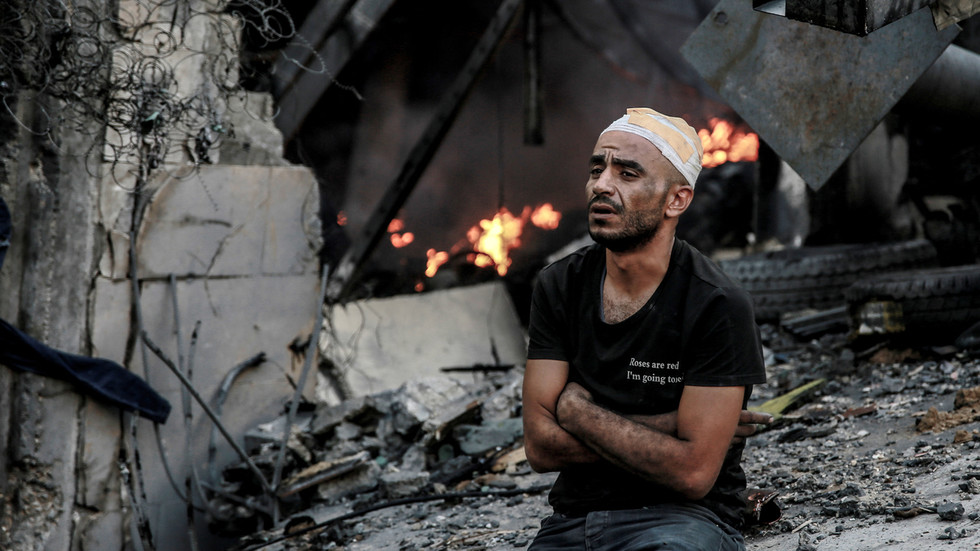
It’s an uphill battle to tell the world about the events in Gaza, as one reporter found out in her run-in with Western media
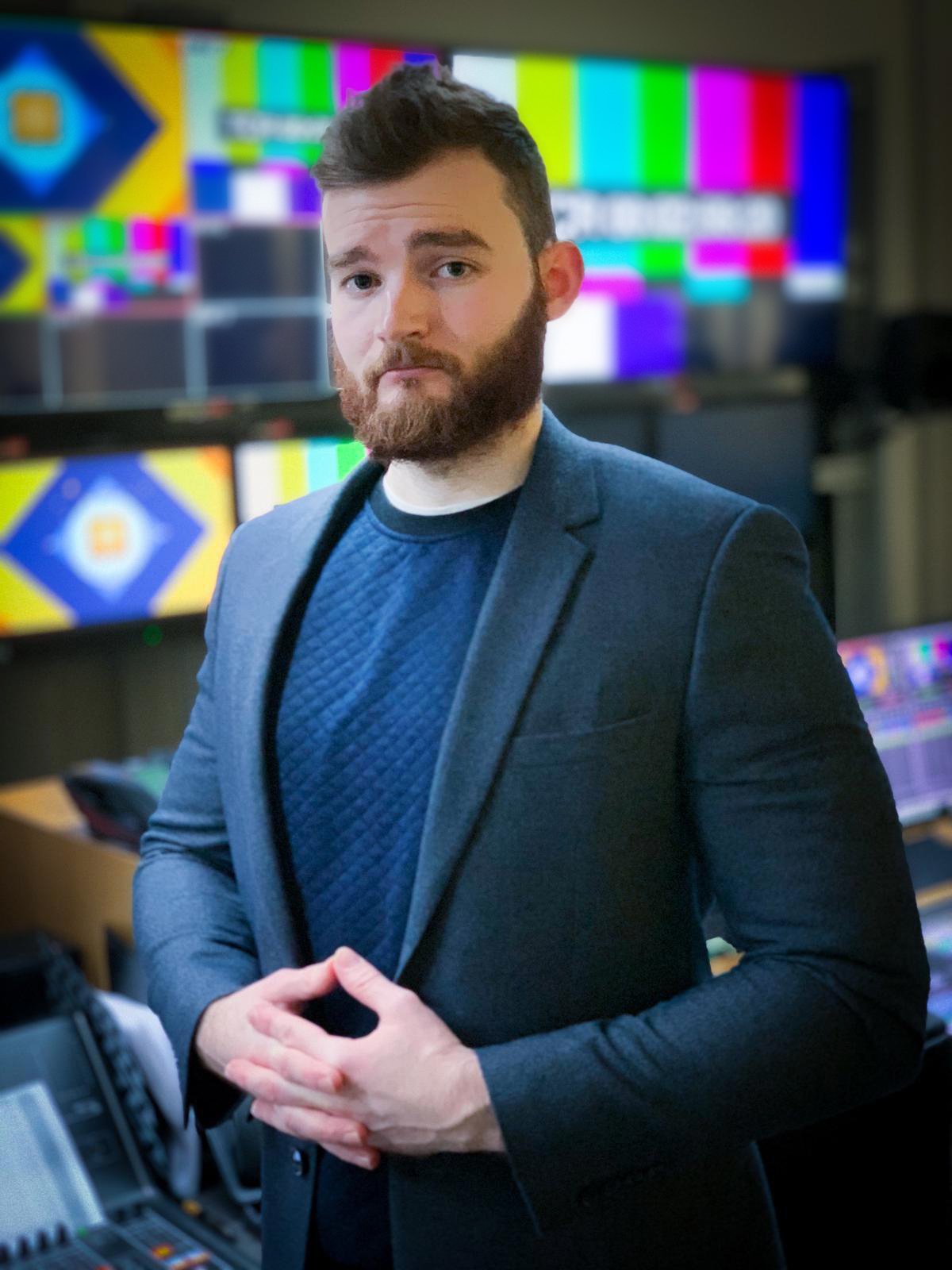
Robert Inlakesh is a political analyst, journalist and documentary filmmaker currently based in London, UK. He has reported from and lived in the Palestinian territories and currently works with Quds News. Director of ‘Steal of the Century: Trump’s Palestine-Israel Catastrophe’.
Robert Inlakesh is a political analyst, journalist and documentary filmmaker currently based in London, UK. He has reported from and lived in the Palestinian territories and currently works with Quds News. Director of ‘Steal of the Century: Trump’s Palestine-Israel Catastrophe’.
@falasteen47
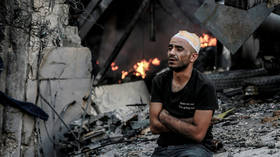
An injured man sits in front of a smoldering building in the aftermath of an Israeli strike on Gaza City on October 26, 2023 © Omar El-Qattaa / AFP
Since October 7, when the Hamas attack on Israeli territory and civilians triggered a destructive bombing campaign against Gaza, Palestinian civilians have been struggling to get the full extent of their plight represented in Western media.
Whether it be British state-media, the BBC, stating that Israelis are “killed,” while Palestinians simply “die”, or CNN, whose reporter had to publicly apologize for “confirming” Israeli reports about babies being beheaded by Hamas, the Western media has displayed shocking bias and double-standards when reporting on the current Gaza-Israel war. Even when a Reuters journalist, Issam Abdallah, was killed along the Lebanese-Israeli border on October 13, the outlet itself wouldn’t even say who committed the strike, instead writing that “missiles fired from the direction of Israel” struck him and six other journalists.
There are few spaces in the Western corporate and state-funded broadcast media where a balanced and neutral approach is taken towards the current war in Gaza. Merely questioning Israel’s right to respond in the way it has chosen, indiscriminately bombing residential areas and openly blocking humanitarian aid into Gaza, is being treated as mutiny, let alone an honest discussion on what led up to the Hamas attack on October 7. Calls for a ceasefire are being labeled as radical and unacceptable. A top State Department official, Josh Paul, amongst others, has resigned from the US government in opposition to this.
One case that highlights the uphill battle Palestinians are having to fight for representation in Western media is that of Gaza-based journalist Wafa al-Udaini.
Al-Udaini was invited to speak on Talk TV, the channel that broadcasts Piers Morgan show, on October 16. Prior to giving the floor to Wafa, host Julia Hartley-Brewer had invited an Israeli military spokesperson, Peter Lerner, on for a discussion, during which he made a number of unsubstantiated allegations. Those went unchallenged by the host, who treated Lerner with respect and allowed him time to finish his points. The tone changes radically when Wafa comes on. Every question is phrased in a way to make her seem non-credible, as Hartley-Brewer challenges her by repeating back Israeli military talking points, even disputing Wafa’s description of civilian deaths as a “massacre” – the same word the host herself makes a point of using to refer to the Hamas attack on Israel.
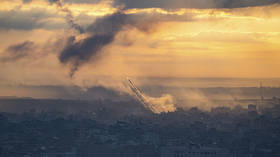
Read more
Hartley-Brewer then asks al-Udaini what she thinks would be “the reasonable response” by Israel to the Hamas attack. That in itself is a complicated question with no easy answer to pack into a few sentences, but when posed to someone on the receiving end of a bombing on the scale of what’s going on in Gaza, it becomes downright loaded. Yet as the Palestinian journalist attempts to provide context or doubt the appropriateness of asking such a question, the host never allows her to make her point, continuously interrupting her and demanding an immediate and direct response. Finally, after giving al-Udaini “one last chance” to answer, Hartley-Brewer cuts her off and ends the interview.
“The anchor killed me,” Wafa told me about the interview as an expression of how insulted she felt. “I feel upset because I didn’t get to tell her anything… She interrupted me and then ended the call by saying “‘we don’t have much time’.” As a reporter on the ground, she was covering events in the English language, and even lost a friend and fellow journalist, Saeed Taweel, who was killed by an Israeli airstrike on October 10. She is not the only one, as multiple journalists have been killed or have lost friends and family members since the war began. “Things really can’t be described,” she told me that day. After having experienced the horrifying bloodshed in Gaza, living under the threat of her entire family being wiped out and having lost a colleague, Wafa fell victim to the double-standards of Western media, having to explain the use of the word “massacre” by someone actually reporting from Gaza.
I also spoke to a Palestinian journalist working as a cameraperson and fixer, who was stationed at the Nasser Hospital in Khan Younis for over a week. The journalist wished to conceal their identity for security reasons and wouldn’t specify where they are currently based, but told me the following:
“As a journalist that is working here in the Gaza Strip, I have covered a number of wars, which you can check the human rights reports about, they will tell you about massacres against civilians. At the Nasser Hospital, we see times where there are non-stop ambulances, cars carrying dead people and we do not see military people killed, it’s all civilians. When you are actually a reporter on the ground, you cannot see what you are seeing and describe it as anything other than a massacre. You tell me, if you see nothing but dead children for an hour, what else are you supposed to say other than it is a massacre? If we were seeing dead fighters, sure, we can have another discussion, but this is the worst war we’ve ever seen and it’s almost all dead children that we are witnessing.”
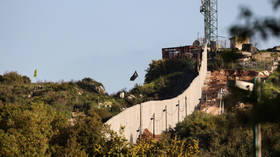
Read more
In the interview with al-Udaini, Hartley-Brewer pointed out that the Israeli military has asked people to move from the north of Gaza to south “so that they can tackle the Hamas fighters,” then proceeded to press the Palestinian as to why she hadn’t left her home in Gaza City. When al-Udaini returns the question, asking “why to leave, this is my homeland, if someone asks you to leave are you going to leave your home?” To which the host responds that “if someone said they are going to bomb me and my family to death, like you are saying ‘a massacre’, then I would leave, yeah I would leave.” By insinuating that al-Udaini is putting her family, as well as herself, at risk, Hartley-Brewer stops just short of implying that should her home be bombed, the responsibility does not fully lie on the Israeli army.
Israeli media picked up on the interview, using it as evidence that Palestinian journalists can’t answer the question as to what the Israeli military should do to them. This, al-Udaini says, was followed by calls to her home from agents working for the Israeli state, some of whom were pretending to be part of international organizations and requested information on the number of people living in her home. Wafa is now being cautious with what she says over the phone and wasn’t able to answer many questions I asked her for fear of how the Israeli military could potentially use it.
If any media outlet in the West were to begin an interview with an Israeli who had suffered threats from Hamas, had lost family and friends, or had rockets fall near their home, by asking them “do you condemn the Israeli military” and “what do you think the Palestinian response against your community should be,” the bias in their approach would be clear to see. However, when the same line of questioning is put to Palestinians, it is treated as commonplace. The reality is that this is a clear display of double-standards, but when coupled with a lack of empathy for people who have suffered the horrors of war, it displays something else – dehumanization.
The statements, views and opinions expressed in this column are solely those of the author and do not necessarily represent those of RT.




